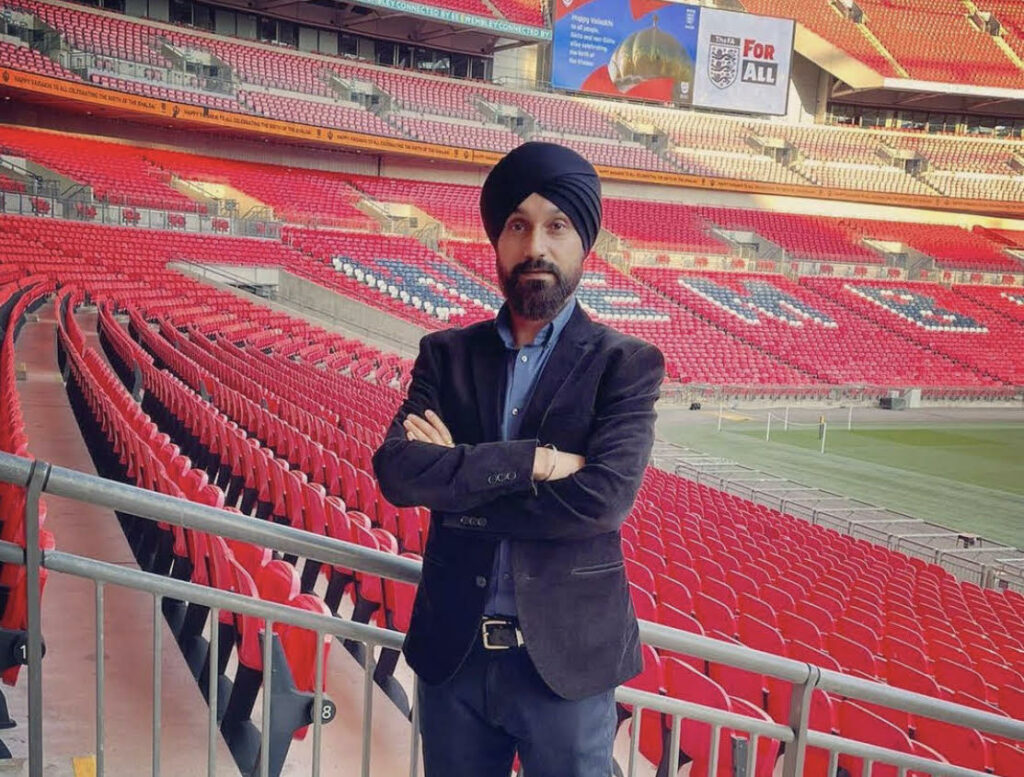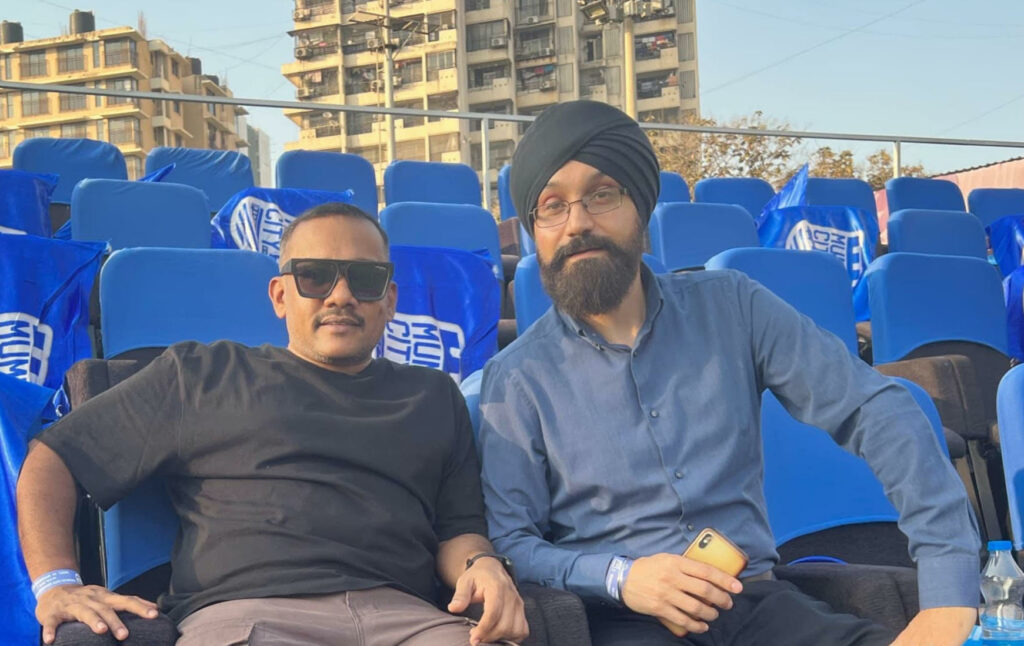Proving doubters wrong, football agent Baljit Rihal breaking new ground
The world of football transfers is a whirlwind of negotiations, strategies, and high-stakes decisions that can make or break the player and the club. One of a handful of British Asians to operate as a licensed football agent, Baljit Rihal is someone who is fully immersed in the intricate four-dimensional chess that is football transfers.
Born to an Indian family who moved to the United Kingdom in the 1960s, Rihal, who has an undergraduate degree in economics and a Master’s in IT, took to the profession to prove others wrong and now heads sports consultancy Inventive Sports which focuses on player representation in the Indian Super League (ISL).

Over the years, Rihal has enabled the moves of former Newcastle United striker Michael Chopra and former Reading manager Steve Coppell to the ISL, and jet-setted from London to Mumbai and back in 48 hours to seal a move for former Canada striker Iain Hume from ATK to Kerala Blasters which he says was the most challenging piece of business he has been involved in.
Rihal, who grew up in London, is also a passionate advocate for Asian inclusion in English football and founded the Asian Football Awards in 2012, which celebrates South Asians in football, and later the Asian Cricket Awards to showcase the unsung heroes from both sports and give them a voice.
In a Q&A session with the Sports Gazette, Rihal talks about his journey, the complexities of transfers, the ethics of agent-player relationships, and improvements needed for more Asian inclusion in English football.
Q: Can you tell us about what you do and your approach to scouting and building your network?
Rihal: As a licensed FIFA Football Agent and an ECB Cricket Agent as well as the head of Inventive Sports, my journey began with international clients – coaches, players, and technical staff – in football leagues like the ISL. Over time, our focus has shifted to nurturing talent within the Indian football market.
Our player representation extends across both domestic and international talents. We have a comprehensive approach to scouting, which includes recommendations from scouts, personal observations, and even players reaching out to us which allows us to gauge how well they align with the objectives and needs of specific clubs.
Q: Can you give us an insight into the intricacies of a football transfer and the role you play in the process?
Rihal: Transfers unfold over several stages. The first step is understanding the requirements of clubs. This is crucial for us to align potential players with these needs. We continuously keep an eye on team performances, injuries, and other factors that could prompt a club to strengthen their squads.
Transfer windows, in the summer and winter, are when negotiations happen. These involve agents, clubs, and players. As an agent, my role includes liaising between clubs and clients. I’m responsible for discussing terms, like salaries, bonuses, and contract conditions including living arrangements, and other specifics.

We often receive inquiries from established agents or the players themselves about opportunities. In such cases, our role is to evaluate the players’ skills and attributes and propose them to clubs that could benefit from their talents. Our focus is on ensuring that the players and the clubs find terms that are mutually advantageous.
Q: How do you ensure your dealings are ethical and fair, particularly when representing younger talents?
Rihal: Rather than just seeking short-term gains, we prioritise the long-term prospects of our younger talents giving them practical advice that empowers them to make informed decisions that will benefit their careers. We maintain an open and transparent line of communication with them. This includes discussing where they could fit best, what salary they can expect, and how to maximise their playing time and attract future opportunities.
We take our responsibility to our clients seriously and advocate for our players’ rights and interests. This could involve pursuing legal action if a player’s salaries go unpaid or if their rights are compromised.
Q: What made you pursue a career as a football agent? Were there any obstacles you encountered along the way?
Rihal: Becoming a football agent was an unexpected turn. It happened during a networking event when during a conversation, an established agent doubted my chances of success as an agent. Determined to prove the agent wrong, I undertook the FIFA agent exam and successfully passed in 2011.
Navigating the football industry as a British Asian came with its share of challenges. Prejudices and misconceptions about the capabilities of British Asians were prevalent and this has spurred my advocacy for increased representation and inclusivity in the industry.
Q: Have you noticed positive changes when it comes to Asian inclusion in football? What areas still need improvement?
Rihal: Positive changes have occurred over the past decade. More British South Asians are gaining entry into leagues and academies, which is a positive sign. However, there’s a clear lack of representation at the higher levels. There is a glass ceiling for South Asians to excel and become regular first team players in the Premier League or the Championship. This is evidenced by the fact that several South Asians have been on the fringes of the first team but haven’t then been afforded the chance and are forced to move to lower leagues or even abroad for opportunities.

For meaningful transformation to occur, the focus must shift from merely acknowledging the issue to actively creating opportunities. Clubs need to engage more deeply with the Asian community, seeking to understand their unique challenges and providing pathways for involvement. Moreover, the lack of representation in higher management roles and board positions remains an area that needs substantial improvement.
Q: Former Swansea City player Yan Dhanda recently expressed his interest to play for India if the country allows dual citizens to represent them in sports. Do you think more players would be interested if the Indian passport regulations were less stringent?
Rihal: The interest of British South Asians to represent India could rise if the Indian passport rules are relaxed. We’ve seen this happen with other countries like Pakistan. The potential to represent their ancestral country will resonate with many of these players. Many have expressed their desire to play for India and I for one have been a big advocate of Persons of Indian Origin (PIOs) being allowed to play for the national team.
I think relaxing these rules will also allow more British Indians to play in the ISL as some of them have hinted at the possibility of playing in the league. I think this could benefit the league and improve the standards in India.
Q: What are your plans for the future?
Rihal: Moving forward, our plans revolve around further expanding our sports consultancy services, with an emphasis on football and cricket. Our goal is to deepen our involvement in both sports, nurturing talents, facilitating connections between players and clubs, and advocating for a more inclusive and diverse representation within the sports industry.